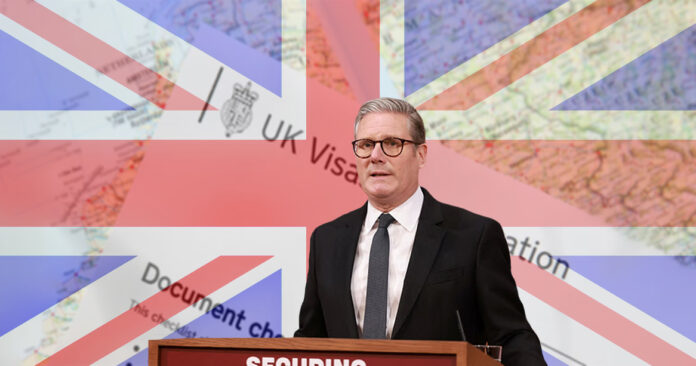On May 12, 2025, Prime Minister Sir Keir Starmer outlined sweeping UK immigration rules intended to cut net migration by a substantial amount, having reached 728,000 in mid-2024. Delivering a statement at a press conference in London, Starmer cautioned that Britain could become an “island of strangers” if tough action was not taken. The new regulations are the cornerstone of Labour’s Immigration White Paper, with the aim of “taking back control of our borders” through more stringent work, study, and family visa channels.

Care Workers Blocked from Foreign Recruitment
The most controversial step is perhaps the suspension of the overseas care worker visa. The government insists rogue recruiters have artificially inflated care job vacancies by recruiting tens of thousands of foreign workers, pushing UK-based candidates to the sidelines. The Home Office insists more than 40,000 suitable domestic candidates are waiting to take their place.
But the care sector is by no means reassured. “This is a devastating blow to a vulnerable sector,” declared Professor Martin Green, CEO of Care England. Amy Clark, a director at a care home in Cornwall, called the move “short-sighted and heartless,” warning that it will make current staff shortages worse.
Ten Years for Citizenship and Improved English Standards
Under the new regime, migrants have to reside in the UK for a decade before they can be eligible for settlement or citizenship—twice the current requirement. While English language thresholds are being increased across all immigration routes, this is now being extended to adult dependents for the first time. These policies, Starmer maintained, are necessary for social cohesion and integration in the long term.

Skilled Visas Now Demand a Degree
Another major reform will restore the skills threshold for work visas to degree level, undoing a policy implemented in 2021 that opened up space for additional low-skilled migration. Work below this threshold will be available only on a short-term basis, and only in areas with proven labour shortages.
Political and Public Backlash
The reaction has been divisive. Conservatives criticised Labour for borrowing their immigration agenda without acknowledging previous reforms. Shadow Home Secretary Chris Philp criticised Starmer as “soft on illegal immigration,” with Reform UK’s Nigel Farage labelling the new plan as “unrealistic political theater.
The Prime Minister’s use of the term “island of strangers” also caused outrage. Care4Calais and other human rights groups’ critics warned that such rhetoric has the potential to fuel xenophobia and provoke far-right backlash.
A Gamble on Public Sentiment
Though Starmer maintains the actions are intended to “balance compassion with control,” most worry that they signal an abandonment of Labour’s progressive spirit. Whether they cut migration or merely fuel political conflagrations, the reforms are a turning point in Britain’s immigration debate. At least this much is certain: the stakes—are higher than ever—for policy, public cohesion, and party legitimacy.
Stay tuned to Brandsynario for latest news and updates





































